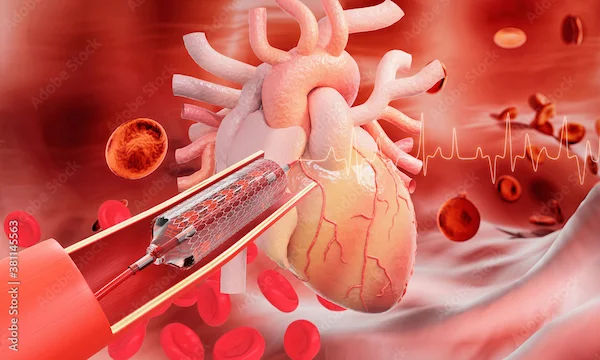Angioplasty Risk Factors
Learn about the potential risks of angioplasty, who may be more vulnerable, and what steps might help reduce complications before and after the procedure.

Written by Dr.Sonia Bhatt
Last updated on 3rd Jul, 2025

Introduction
If you or a loved one has been advised to undergo angioplasty, you may have questions about the procedure and its risks. Angioplasty is a common treatment for blocked or narrowed arteries, but like any medical procedure, it comes with certain risks. This article will help you understand these risk factors in simple terms, along with tips to minimise complications and improve heart health.
What Is Angioplasty?
Angioplasty is a minimally invasive procedure used to open clogged arteries, usually in the heart, that may be causing chest pain (angina) or a heart attack. A thin tube (catheter) with a small balloon at its tip is inserted into the blocked artery. The balloon is inflated to widen the artery, and often a small mesh tube called a stent is placed to keep the artery open.
Consult Top Specialists for Personalised Heart Health Advice
Common Risk Factors of Angioplasty
While angioplasty is generally safe, certain factors can increase the risk of complications. Knowing these risks can help you and your doctor make informed decisions.
1. Age and Overall Health
Some people may face higher risks due to age or existing health conditions.
Older adults, especially those above 70, may have a higher risk of complications due to weaker blood vessels or other health conditions.
Existing health problems like diabetes, kidney disease, or lung disease can increase risks.
2. Severity of Heart Disease
The extent and location of arterial blockages may influence procedural risks.
Patients with multiple blocked arteries or severe blockages may face higher risks during the procedure.
If the blockage is in a critical artery such as the left main coronary artery, the procedure may be riskier.
3. Emergency vs. Planned Angioplasty
The timing and urgency of the procedure may affect safety outcomes.
Emergency angioplasty, done during a heart attack, carries higher risks than planned angioplasty for stable angina.
In emergencies, the heart may already be weakened, increasing the chance of complications.
4. Allergies or Reactions to Contrast Dye
Some individuals may be sensitive to the materials used during the procedure.
Some patients may be allergic to the dye used during angioplasty, leading to rashes, nausea, or, in rare cases, severe reactions.
Inform your doctor if you have had previous reactions to contrast dye.
5. Bleeding and Blood Clot Risks
The use of blood thinners is crucial during angioplasty but may also increase certain risks.
Since blood thinners are used during angioplasty, excessive bleeding can occur at the catheter insertion site, usually the wrist or groin.
There’s also a small risk of blood clots forming around the stent, which can cause another blockage.
6. Kidney Problems
People with kidney issues should take extra care during procedures involving contrast dye.
The contrast dye used in angioplasty can affect kidney function, especially in people with pre-existing kidney disease.
Staying hydrated before and after the procedure helps reduce this risk.
7. Infection
Though rare, infections can occur at the catheter insertion site. Keeping the area clean and following post-procedure care instructions minimises this risk.
How to Reduce Risks Before and After Angioplasty
Proactive care and lifestyle habits may play a key role in lowering the risk of complications.
Before the Procedure
Taking certain precautions before angioplasty may help ensure a smoother experience.
Discuss Your Medical History – Inform your doctor about any allergies, medications, or existing conditions like diabetes or kidney disease.
Follow Pre-Procedure Instructions – You may need to stop certain medications, like blood thinners temporarily.
Stay Hydrated – Drinking water helps flush out the contrast dye and protects your kidneys.
After the Procedure
Careful monitoring and good habits after the procedure may enhance recovery and reduce complications.
Monitor the Insertion Site – Watch for swelling, bleeding, or unusual pain where the catheter was inserted.
Take Prescribed Medications – Blood thinners and antiplatelet drugs, like aspirin or clopidogrel, prevent clots from forming around the stent.
Follow a Heart-Healthy Lifestyle – Eating a balanced diet, exercising regularly, and quitting smoking improve recovery and long-term heart health.
When to Seek Immediate Medical Help
Call your doctor or visit the hospital if you experience:
Severe chest pain or pressure
Heavy bleeding or swelling at the catheter site
Fever, chills, or signs of infection
Sudden shortness of breath or dizziness
Final Thoughts
Angioplasty is a life-saving procedure for many people with heart disease, but understanding the risks helps in making informed decisions. By working closely with your doctor and following a heart-healthy lifestyle, you can minimise complications and improve your recovery.
If you have concerns about angioplasty or need expert advice, consider consulting a cardiologist. You can easily book an appointment or schedule a heart health check-up through Apollo 24|7 for personalised care.
Consult Top Cardiologists
Consult Top Specialists for Personalised Heart Health Advice

Dr. Sumanta Chatterjee
Cardiologist
12 Years • MBBS,MD General Medicine,DM Cardiology
Kolkata
HealthYou Speciality Clinic & Diagnostics., Kolkata
(25+ Patients)

Dr. Mangesh Danej
Cardiologist
8 Years • MBBS, MD (General Medicine), DNB (Cardiology)
Pune
Dr Danej clinic, Pune
(375+ Patients)

Dr. Amit. A. Bharadiya
Cardiologist
12 Years • MBBS, MD General Medicine, DNB Cardiology, FSCAI
Maharashtra
Surabhi Hospital, Maharashtra, Maharashtra

Dr Yogendra Singh Rajput
Cardiologist
16 Years • MBBS, MD (General Madicine), DM (Cardiology)
Gurugram
Svasthya Child & Cardiac Care, Gurugram
Dr. Dixit Garg
Cardiologist
10 Years • MBBS , DNB (General medicine) , DNB (cardiology)
Gurugram
Smiles & Hearts, Gurugram
Consult Top Cardiologists

Dr. Sumanta Chatterjee
Cardiologist
12 Years • MBBS,MD General Medicine,DM Cardiology
Kolkata
HealthYou Speciality Clinic & Diagnostics., Kolkata
(25+ Patients)

Dr. Mangesh Danej
Cardiologist
8 Years • MBBS, MD (General Medicine), DNB (Cardiology)
Pune
Dr Danej clinic, Pune
(375+ Patients)

Dr. Amit. A. Bharadiya
Cardiologist
12 Years • MBBS, MD General Medicine, DNB Cardiology, FSCAI
Maharashtra
Surabhi Hospital, Maharashtra, Maharashtra

Dr Yogendra Singh Rajput
Cardiologist
16 Years • MBBS, MD (General Madicine), DM (Cardiology)
Gurugram
Svasthya Child & Cardiac Care, Gurugram
Dr. Dixit Garg
Cardiologist
10 Years • MBBS , DNB (General medicine) , DNB (cardiology)
Gurugram
Smiles & Hearts, Gurugram



.webp)
